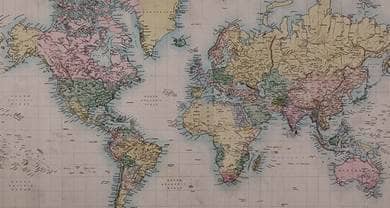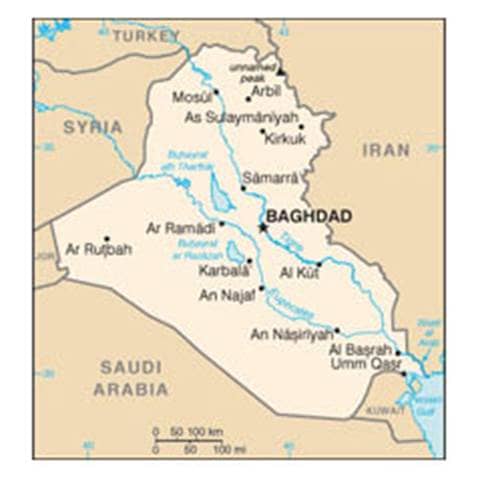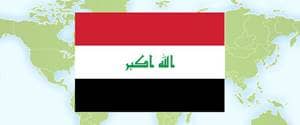- Trending:
- Pope Leo Xiv
- |
- Israel
- |
- Trump
- |
- Social Justice
- |
- Peace
- |
- Love

RELIGION LIBRARY
Iraq

Due to increased violence, internal migration, and lack of governmental capacity, religious demography statistics varied. Numbers are often estimates from nongovernmental organizations (NGOs) rather than census data or other official sources. The Government passed a census law, which will allow them to conduct a nationwide census in the future.
The country has an area of 168,754 square miles and a population of about 28.9 million. According to statistics provided by the Government, 97 percent of the population is Muslim. Shi'a Muslims--predominantly Arabs, but also Turkmen, Faili (Shi'a) Kurds, and other groups--constitute a 60 to 65 percent majority. Arab and Kurdish Sunni Muslims make up 32 to 37 percent of the population; of these, 18 to 20 percent are Sunni Kurds, 12 to 16 percent are Sunni Arabs, and the remaining 1 to 2 percent are Sunni Turkmen. Approximately 3 percent of the population comprises Christians, Yezidis, Sabean-Mandaeans, Baha'is, Shabaks, Kaka'is (sometimes referred to as Ahl-e Haqq), and a very small number of Jews. Shi'a, although predominantly located in the south and east, are also a majority in Baghdad and have communities in most parts of the country. Sunnis form the majority in the west, center, and the north of the country.
Reported estimates from Christian leaders of the Christian population in 2003 ranged from 800,000 to 1.4 million. Current population estimates by Christian leaders range from 500,000 to 600,000. Approximately two-thirds of Christians are Chaldeans (an eastern rite of the Catholic Church), nearly one-fifth are Assyrians (Church of the East), and the remainder are Syriacs (Eastern Orthodox), Armenians (Roman Catholic and Eastern Orthodox), Anglicans, and other Protestants. Most Assyrian Christians are in the north, and most Syriac Christians are split between Baghdad, Kirkuk, and Ninewa Province. Christian leaders estimate that as much as 50 percent of the country's Christian population lives in Baghdad, and 30 to 40 percent lives in the north, with the largest Christian communities located in and around Mosul, Erbil, Dohuk, and Kirkuk. The Archbishop of the Armenian Orthodox Diocese reported that 15,000 to 16,000 Armenian Christians remained in the country, primarily in the cities of Baghdad, Basrah, Kirkuk, and Mosul. Evangelical Christians reportedly number between 5,000 and 6,000. They can be found in the northern part of the country, as well as in Baghdad, with a very small number residing in Basrah.
Yezidi leaders reported that most of the country's 500,000 to 600,000 Yezidis reside in the north, with 15 percent in Dohuk Province and the rest in Ninewa Province. Shabak leaders stated there are 200,000 to 500,000 Shabaks, who reside mainly in the north, near Mosul. Estimates of the size of the Sabean-Mandaean community vary widely; according to Sabean-Mandaean leaders, 3,500 to 7,000 remained in the country, down from an estimated 50,000 to 60,000 in 2003. The Baha'i leadership reported that their members number fewer than 2,000 and are spread throughout the country in small groups. A sizable portion of the Jewish community, which once had a significant presence in the country, left in the years immediately following the creation of the State of Israel in 1948. Eight Jews remain in Baghdad, and none are known to live in other parts of the country.
As of June 2009, the office of the United Nations High Commissioner for Refugees (UNHCR) estimated that approximately 1.5 million Iraqis had fled and remain outside the country. In May 2009 UNHCR reported that 57 percent of all registered Iraqi refugees (in Syria, Jordan, Lebanon, Turkey, and Egypt) were Sunni, 21 percent were Shi'a, 4 percent were non-specified Muslim, 14 percent were Christian, 3 percent were Sabean-Mandaean, and fewer than 1 percent were Yezidi. In June 2009 the International Organization for Migration (IOM) reported that there are an estimated 2.8 million internally displaced persons in the country. After the al-Askariya mosque bombings in February 2006, 1.6 million persons were displaced. An estimated 59 percent of the internally displaced are Shi'a Muslims, 35 percent are Sunni Muslims, 5 percent are Christians, and fewer than 1 percent are Yezidis.
| Population | Population (2009 est.) 28,945,657 |
| Religious Demographics | Muslim 97% (Shi'a 60%-65%, Sunni 32%-37%), Christian or other 3% |
| Ethnic Groups | Ethnic Groups Arab 75%-80%, Kurdish 15%-20%, Turkoman, Assyrian* - *1 *2, or other 5% |
| Languages | Languages Arabic, Kurdish (official in Kurdish regions), Turkoman (a Turkish dialect), Assyrian* - *1 *2 (Neo-Aramaic), Armenian |
| Country Flag |  |










